Gudbrandsdalen is a valley and traditional district in Oppland. This grand, central valley runs for some 250 km from Lillehammer to the uplands and central mountains. Nicknamed "the valley of valleys" because of its size and variety. In addition to the main valley there is a web of tributaries particularly from the west and the central mountains. The valley makes up more than half of Oppland county. Gudbrandsdalen is surrounded by the highest mountains in Scandinavia. The central mountains to the west create a long rain shadow leaving little precipitation for most of the area. Summers are pleasantly warm.
The valley hosted major events at the 1994 winter Olympics, alpine skiing venues at Kvitfjell and Hafjell are now popular winter sport resorts. The valley is home to a number of ancient wooden buildings (including stave churches) and other cultural heritage. Overland transport between Oslo and central eastern lowlands to Nordfjord, Trøndelag and Møre og Romsdal runs through the valley.
Towns
- 🌍 Otta
- 🌍 Lillehammer
- 🌍 Lom Lom village is the regional centre in Ottadalen.
Other destinations
- 🌍 Hafjell - ski resort (Olympic slalom)
- 🌍 Kvitfjell - alpine ski resort (Olympic downhill)
- 🌍 Nordseter - highland cross-country resort
- Notable adjacent valleys (tributaries) in Gudbrandsdalen district
- Ottadalen home of Otta river
- Heidal and Sjodal home of the Sjoa river
- Vinstra river valley
- Frydalen home of Frya river
- Gausdal and Espedal
Understand
Gudbrandsdalen stretches from Lillehammer at the northern shores of Lake Mjøsa to the higlands around Dombås and county border with Møre og Romsdal at Geiranger and Bjorli, about 250 km. At the watershed there is in fact a lake, Lesjaskogsvatnet at Lesjaskog, that is shared by Lågen river (flowing east) and Rauma river (flowing west to Åndalsnes). Gudbrandsdalen is home to the great Lågen river, Norway's second biggest. The Gudbrandsdalen district also includes several connected valleys and their tributaries (notably Ottdalen with Otta river, as well as Gausa, Sjoa and Vinstra rivers), large parts of Oppland county falls within this area. These tributaries are among Norway's prettiest and wildest rivers. Many of these rivers, particularly from the west (the right) carry glacial melt water, as can be seen on the opaque color. Hjerkinn and upper Folldal in the Dovre plateau has traditionally been affiliated with Gudbrandsdalen although rivers there flow east to Alvdal.
Gudbrandsdalen and adjacent valleys are surrounded by major mountain ranges such as Jotunheimen, Breheimen (next door to Jostedalsbreen), Reinheimen/Tafjord/Romsdalen, Dovrefjell and Rondane. At Otta the main valley is joined by the major Otta valley that also holds the road to Stryn and Geiranger.
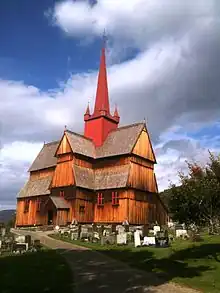
Because of its central position in the interior of South Norway, Gudbrandsdalen hosts E6 (the main north-south road with branch to Åndalsnes and Ålesund) and the Oslo-Trondheim railway (with arm to Åndalsnes). About 70,000 people live in the area, the regional centre Lillehammer is home to about half the population.
Gudbrandsdalen and tributary valleys is a traditional district. This area sits in the rain shadow and is one of the driest areas in Norway. The climate is mostly continental: winters are cold and summers are mild. Bjorli, the most north-western village, receives heavy snowfall and is a popular winter resort.
History
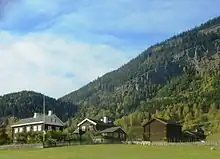
Henrik Ibsen, Norwegian playwright, hiked through the valley in 1862 and compiled material for dramas "Peer Gynt" as well as "Brand".
During the invasion of Norway in April 1940, some of the heaviest fighting occurred in Gudbrandsdalen around village Kvam. British troops had landed at Åndalsnes to support the Norwegian Army and with plans to recapture Trondheim. In addition to the sea battle at Narvik, this was the first engagement of Allied and German troops during the war (a few weeks later fighting began in France and Be-Ne-Lux). The British troops were not prepared for the task. There is a war memorial at Kvam. The first US casualty in world war II was the US military attache killed during the bombing of Dombås station. There is a war memorial at Dombås. The King, cabinet and Bank of Norway's gold and cash holdings were evacuated through Gudbrandsdalen towards Åndalsnes and Molde amidst heavy fighting in a bold and legendary operation. The king and the cabinet were hiding in Gudbrandsdalen while waiting for safe passage to unoccupied harbors at Åndalsnes and Molde. This was one of the most dramatic and decisive events in the history of modern Norway. British troops were evacuated on May 2. The failed British campaign in Gudbrandsdalen (and Namsos) led to the downfall of Neville Chamberlain as prime minister and Winston Churchill became prime minister.
Ironically, more than 300 years earlier Scottish mercenary troops landed at Åndalsnes and marched through Gudbrandsdalen to join the war in Sweden. Between Otta and Kvam the Scottish troops were slaughtered my local militia in a legendary ambush. This event is also included in the Kvam war memorial.
Talk
The language is Norwegian with some notable dialect differences, particularly in the northern valley. English is spoken everywhere.
Get in
By plane
- Oslo Airport, 140 km south of Lillehammer. A major international airport with flights from the USA and major European cities.
By train
- Oslo-Trondheim railway (Dovrebanen) via Oslo airport at Gardermoen
- Dombås-Åndalsnes railway (Raumabanen)
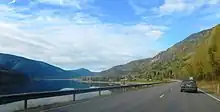
By car
- See also E6 through Sweden and Norway
 Oslo-Dombås-Trondheim main road, scenic drive through Dovre plateau
Oslo-Dombås-Trondheim main road, scenic drive through Dovre plateau Ålesund-Åndalsnes-Dombås, the Bjorli-Dombås stretch runs through Lesja district in Northern Gudbrandsdal, very scenic drive.
Ålesund-Åndalsnes-Dombås, the Bjorli-Dombås stretch runs through Lesja district in Northern Gudbrandsdal, very scenic drive. Otta-Stryn-Måløy main road, scenic drive.
Otta-Stryn-Måløy main road, scenic drive.- Road 51 (Valdresflya pass) from Fagernes (Valdres) to Vågå, scenic drive, national tourist route.
- Road 55 (Sognefjellet pass) from Sogndal and Luster (Sognefjorden area) to Bøverdalen and Lom, scenic drive, national tourist route.
- Road 27 from Folldal to Ringbu, also known as Rondane road, national tourist route
- Road 63 from Geiranger to Skjåk and further to Otta
Get around
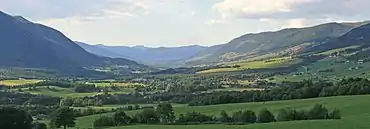
- By rail
The Oslo-Lillehammer-Trondheim railway (Dovrebanen) runs along the valley until Dombås where the railway climbs onto the Dovrefjell plateau. The Dombås-Åndalsnes railway (Raumabanen) continues along the northernmost section of the valley (Lesja-Bjorli area). There is no railway in the Otta-Lom-Skjåk valley (Ottadalen).
- 🌍 Dombås railway station. Dombås junction where the Rauma railway branches off towards Åndalsnes.
- By car
For more details see: Driving in Norway
 Lillehammer-Dombås main road
Lillehammer-Dombås main road Bjorli-Lesja-Dombås
Bjorli-Lesja-Dombås Otta-Lom-Skjåk main road (also served by bus)
Otta-Lom-Skjåk main road (also served by bus)- County roads and private (toll) roads into the hinterland
See
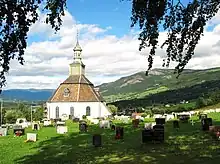
Culture
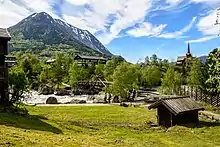
- 🌍 Kvam (war memorial). Heavy fighting during second world war between British and German troops.
- 🌍 Ringebu Stave Church (Ringebu stavkyrkje), South of Ringebu village (Leave E6 at sign). One of the few remaining of Norway's once countless stave churches. Built around 1200 AD. 50 NOK (interior).
- 🌍 Sel church (Sel kyrkje), Valley floor just north of Otta village (Close to road E6 at Sel). Wooden church, 1742. Colorful, decorated interior, particularly the rich altarpiece carved in wood, copied largely from Lesja Church.
- 🌍 Lesja Church (Lesja kyrkje), Valley floor at Lesja village (Leave E136 at sign). A landmark in the high, even valley at Lesja. Noted mainly for the large and unusually rich altarpiece carved in wood, a masterpiece by Jacob Klukstad, Gudbrandsdalen craftsman. Church erected 1749.
- 🌍 Lom. Lom village or more precisely Fossbergom is the regional centre in Lom district and Ottadalen valley (branch of Gudbrandsdalen). Lom village has a fine location at the confluence of Børve river and Otta river, and Børve river creates a fine waterfall in the centre. Lom village has successfully maintained a consistent traditional style of building even for modern buildings. The ancient stave church stands near the centre.
Nature
- 🌍 Rondane range and national park (Road 27). 24/7. Rondane mountains was protected in 1962 as Norway's first national park. No road through the park but road 27 along the edge, access also from Høvringen at E6 north of Otta. free.
- 🌍 Dovrefjell, Dombås-Oppdal-Folldal (Road E6 and Dovre (Trondheim) railway, road 29). 24/7. Dovrefjell mountains/plateau and national park. free.
- 🌍 Jotunheimen range (Road 15 to Vågå (then road 51) or Lom (road 55). Also road 257 Sjoa-Heidal). 24/7. Jotunheimen alpine mountains (national park). free.
- 🌍 Sjoa river and Heidal valley (Road 257 from the main valley). 24/7. Heidal is known for its fine ancient wooden architecture, including Bjølstad farm. The Sjoa river, well-known among rafters, flows from Jotunheimen through the valley into the main valley. free.
File:Ridderspranget II.jpg
Do
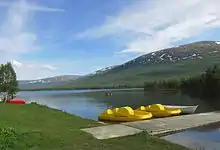
Skiing
- Cross-country skiing in all mountain areas and close to towns.
- 🌍 Nordseter. Wide network of groomed cross-country trails the hills near Lillehammer
- Alpine skiing
- 🌍 Hafjell ski resort (Hafjell alpinsenter), Øyer (E6 just north of Lillehammer). Hafjell alpine skiing resort was a 1994 olympic venue. Summer activities too
- Kvitfjell (1994 Olympic downhill venue)
- Skeikampen
- Grotli
- 🌍 Bjorli ski resort, Bjorli (Dombås-Åndalsnes along E136 or Rauma railway). Bjorli ski resort does not have big and very steep hills, but plenty of snow and long season.
- Dombås
Other outdoor
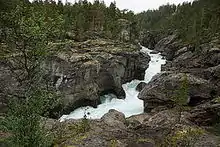
Gudbrandsdalen cuts deep into Norway's wilderness and as the big valley is also home to major rivers, including rivers popular among rafters. Warning: Only skilled rafters should go down rivers on their own. There are numerous obstacles such as power stations, rapids, canyons and waterfalls.
- 🌍 Sjoa river rafting, Heidal, Sjoa river (Sjoa village and road 257). The Sjoa river is famous and used for rafting - either alone in kayak (only for the very experienced) or on large rafts. Caution: The river is treacherous, go with a guide and get first hand information. Several operators offer rafting.
- Hiking in mountains and uplands Gudbrandsdalen and adjacent valleys cuts into the base of the central mountains and uplands. Day hikes and in particular multi-day hikes are abundant in these areas:
- Jotunheimen
- Breheimen-Stryn
- Lillehammer-Nordseter-Ringebu-Venabu uplands
- Rondane-Dovrefjell
- Dovre-Sunndalsfjella
- Tafjordfjella-Reinheimen
- Huldreheimen (West Gausdal-Valdresflya)
Amusement
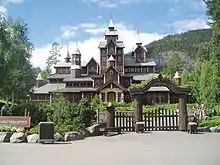
- Hunderfossen Troll Park (Hunderfossen familiepark) (15 km north of Lillehammer on E6). Amusement park (fair) for families
Eat
Drink
Stay safe
Go next
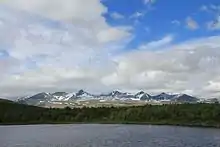
- Rondane and Dovrefjell mountains
- Jotunheimen mountains
- Valdres - a parallel valley in the uplands
- Sogn og Fjordane: Luster, Stryn
- Møre og Romsdal: Åndalsnes and Geiranger
- Oppdal - ski resort in the Trøndelag uplands
- Oslo
| Routes through Gudbrandsdalen |
| Maløy ← Stryn ← | W |
→ Otta (END) |
| Oslo ← Gardermoen ← | S |
→ Oppdal → Trondheim |
| Dombås (END) ← | E |
→ Åndalsnes → Ålesund |